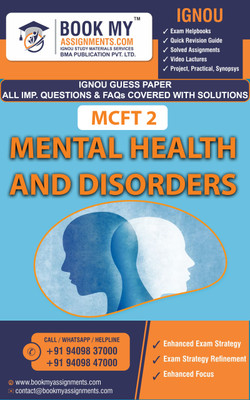IGNOU MCFT 2 Mental Health and Disorders | Guess Paper | Important Question Answer |Master of Science in Food Safety and Quality Management (MSCFSQM)(Paperback, BMA Publication)
Quick Overview
Product Price Comparison
Introduction to Mental Health and Disorders:Overview of the course objectives, scope, and importance of understanding mental health within family contexts.Introduction to key concepts, theories, and research methods in mental health and psychology.Understanding Mental Health and Well-being:Exploration of definitions of mental health and well-being, including factors that contribute to psychological flourishing.Introduction to positive psychology principles and practices for enhancing mental health.Etiology and Diagnosis of Mental Disorders:Study of the causes, risk factors, and diagnostic criteria for common mental disorders, including mood disorders, anxiety disorders, and psychotic disorders.Introduction to the Diagnostic and Statistical Manual of Mental Disorders (DSM) and its use in diagnosing mental health conditions.Biopsychosocial Model of Mental Health:Understanding of the biopsychosocial model and its application to understanding the interaction of biological, psychological, and social factors in mental health and illness.Exploration of the role of genetics, brain chemistry, psychological processes, and social determinants in mental health outcomes.Stress, Coping, and Resilience:Examination of stress theories, coping mechanisms, and resilience factors in maintaining mental health.Understanding of the impact of stressors, trauma, and adversity on mental well-being, as well as protective factors and coping strategies.Mental Health Across the Lifespan:Study of mental health issues and challenges at different developmental stages, including childhood, adolescence, adulthood, and old age.Exploration of age-specific risk factors, protective factors, and interventions for promoting mental health across the lifespan.Family Dynamics and Mental Health:Understanding of the bidirectional relationship between family dynamics and mental health outcomes.Exploration of family systems theory, attachment theory, and the role of family relationships in shaping mental health and resilience.Impact of Mental Disorders on Families:Examination of the impact of mental disorders on family functioning, relationships, and roles.Understanding of caregiver burden, family stigma, and coping strategies for families living with mental illness.Treatment Approaches and Interventions:Overview of evidence-based treatment approaches for mental disorders, including psychotherapy, medication, and alternative therapies.Exploration of family therapy, group therapy, and other interventions for addressing mental health issues within family systems.Cultural and Diversity Considerations:Understanding of cultural variations in perceptions of mental health, help-seeking behaviors, and treatment preferences.Exploration of culturally sensitive approaches to assessment, diagnosis, and treatment of mental disorders.


